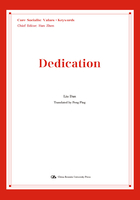
Chapter One
What Is Dedication: A Citizen's Fundamental Professional Norm
"Dedication" has its Chinese equivalent "jing ye (敬业)". The character "jing (敬)" was originally a term in the traditional Chinese Confucianism. Confucius insisted that a man should be diligent and dedicated to his work. In his opinion, a man should be dedicated to what he does, to what he thinks of and what kind of man he should cultivate himself into. The character "ye (业)" means "occupation, profession or work". In the Dictionary of Modern Chinese Language, jingye is explained as "dedicated to one's study or work".
The spirit of dedication, as a simple but lofty virtue, has its long history in both the East and the West. In his influential classical work The Protestant Ethic and the Spirit of Capitalism, Max Weber, a famous German sociologist, points out that the protestant ethic with "conception of the calling" as the core is the intrinsic drive of the formation and development of capitalism in the West. In Protestantism, labor is regarded as a holy mission and glorious duty imposed by God. People are encouraged to work hard and dedicate themselves to their work. That is to say, "The only way of living acceptable to God was not to surpass worldly morality in monastic asceticism, but solely through the fulfillment of the obligations imposed upon the individual by his position in the world. That was his calling." The conception of the calling has not only led to the emergence of the rational economists demanded by the modern capitalism but also enabled the employers to have a labor force who are earnest in and dedicated to their work while being loyal to their belief.
Dedication is also an important traditional Chinese virtue. In Liji (Book of Rites), there is a saying "dedicated to our career and getting along well in groups". Confucius and his disciples all advocated dedication and sincerity. They insisted that a man should "be humble in his conduct and respectful in serving his superior" and that he should "reverently discharge his duties, and make his emolument a secondary consideration". They emphasized that a man should work hard and dedicate himself to his work for the whole life. According to Zhu Xi, a Chinese philosopher in the Song Dynasty, dedication means devotion to the work. That means, a man should be serious and reverent in what he does and dedicated to it. Liang Qichao, a Chinese scholar in modern times, proposed a question in his article "Dedication to and Love for Work", "Why should we be dedicated to our work?" He answered, "Firstly it is because a man works to live and lives to work since work is a part of our life; secondly it is because whatever we do is something holy." Therefore, dedication means devotion to one's own work. We can fulfill our life value through our dedication to and earnestness in it.
Today, dedication embodies a basic professional ethic of a citizen. It is a man's objective, value, interest and attitude. In other words, whether our work matches our competence, and whether our present job is of help to our professional development, we should take dedication as our basic quality, attitude, habit, spirit and belief. Dedication requires us to devote ourselves to and concentrate ourselves on our work. Facts have shown that as long as we are reverent in and dedicated to whatever we do, and pursue excellence out of it, we will make our own achievements and our bright future.